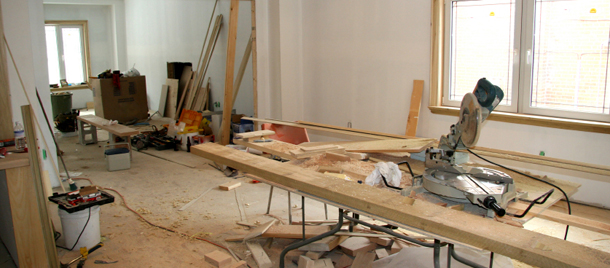Could you save money by doing it yourself or is it a job for the experts? Read the House and Home guide to doable DIY.
- Do it Yourself:
- Call in the Experts:
Do It Yourself:
Repair Creaking Stairs - What to look for:
Try to identify where the noise is worst, it might be only one step. The best way to deal with creaking stairs is from below, so if it is carpeted you will need to take the carpet up.
How to:
To silence squeaks shake talcum powder between the floor boards, then refix the loose boards to the joists with long nails at an angle. A persistent squeak may need tackling from the stairs. Glue a triangular block of wood into the corner of the tread and riser and secure with screws. With old stairs you may have to replace the stair rise to sport out the squeak.
Cost: From €10
Replace Windows - What to look for:
Small cracks, damp wind whistling through the frames, condensation build-up especially in the morning, cracked putty around the frames.
How to:
Wearing heavy gardening gloves, criss-cross pieces of masking tape over the window pane, then tap gently out with a hammer. Buy a new pane of glass that is 1.5mm smaller than the window on all sides, lay a fresh bed of putty after you chipped out the old stuff and press the new glass into position around the edges. Inset glazing brads to keep in place.
Cost: From €40
Sort out Dripping Taps - What to look for:
Continuous dripping after you've turned off the tap, from the spout or around the fitting. Check that the problem isn't more serious, such as a cracked pipe.
How to:
Don't panic a dripping tap may just need a new washer. Turn off the water supply first, then use a spanner to unscrew the tap cover. Place a soft cloth between the tap and spanner to avoid scratching. Unscrew the large nut, and replace the old washer with the new one. If the inner parts have corroded you will need to bring the tap to a plumbing supply shop to get a new insert.
Lay a wooden floor - What to look for:
Careful repair and preparation is vital to laying a wooden floor. The floor should be level, clean, dry and smooth - remove all dust, nails and carpet tacks first.
How To:
Laying a solid wood floor is definitely not a DIY job. You can however have a go at laying a laminate floor, and most come with fool proof instructions to make the job easy. Laminates are usually laid as a floating floor over a sub floor or directly onto concrete. The boards are tongue and grooved and can either and can either be glued or clicked into position - the latter being the easiest.
Cost: From €10 per sq yard
Knock through the walls - What to look for:
The walls must not be support walls - as in supporting the roof. This is one for the builders. Before attacking anything with a hammer check you don't need planning permission first.
How to:
You will need to hire a skip and get a permit from the council to keep the skip on the street. Ripping down the walls is hard graft and you'll probably have to rent out a chaser hammer to take the plaster off the walls first and also a sledge hammer. Cover everything in dust sheets, wear a protective mask.
Cost: From €500
Tiling - What to look for:
Preparing walls for tiling is important. Remove old wallpaper; fill holes and smooth patches so the wall is flat. Stabilise walls or new plaster with a PVA solution.
How to:
Be realistic tile within your capabilities. If you are a first-time tiler choose a simple project to start with. Plan area to be tiled leaving cuts and intricacies until last. Apply adhesive with a notched spreader and use spacers (or matchsticks) to maintain spaces between the tiles as you grout. Tiles cannot stretch so when cutting be as precise as you can.
Cost: From €200
Call in the Experts:

Put on a New Roof - What to look for:
Damp patches in the ceiling after a rain fall, bubbled wallpaper, loose or cracked tiles, or birds nesting in the attic.
How to:
This is a tricky job and definitely one for a professional. Besides all of the roofing tools and materials needed to get you started you'd also have to be pretty nimble on your feet. A professional roofer will strip back your old roof, and replace the flashings (lead or aluminum seals used to stop water penetrating at the point where the roof meets a chimney), felt, slates and ridge tiles.
Cost: From €2,000
Install a New Bathroom - What to look for:
Think about where you want it to go. If you're considering under the stairs make sure there is enough standing room and ample place for the toilet to be used comfortably.
How to:
It's a messy job fiddling around with waste pipes, S bends and water. A professional plumber will have the job finished within a couple of days. Your new bathroom will have to be plumbed, floorboards lifted and walls drilled. The positioning of the sanitary ware is a delicate operation and must be installed according to manufacturer's recommendations.
Cost: From €2,500 (not including sanitary ware)
Plumb a washing machine- What to look for:
Check that the kitchen or utility room is pre-plumbed. If not, new plumbing will have to be installed, which of course is more expensive.
How to:
Easy assemble DIY plumbing equipment is available from good hardware stores but if you're not an able DIYer don't thru this at home, especially if there's no pre-plumbing for you to connect up the machine. Ideally washing machines should be located close to the kitchen sink - the further away, the more difficult it is to connect to the water supply and install drainage pipes.
Cost: €150
Rewiring - What to look for:
Frayed or loose wires, dodgy sockets that look like they could come away from the wall at any moment, and flickering lights.
How to:
Unless you're a qualified electrician don't event attempt to rewire your house yourself. Messing about with wires and electricity is extremely dangerous. An electrician will strip out the old wires and install new ones, along with new sockets, plugs, light fittings and a new fuse box. Think about where you want your new wall sockets to go, it is always a good idea to get some extra.





